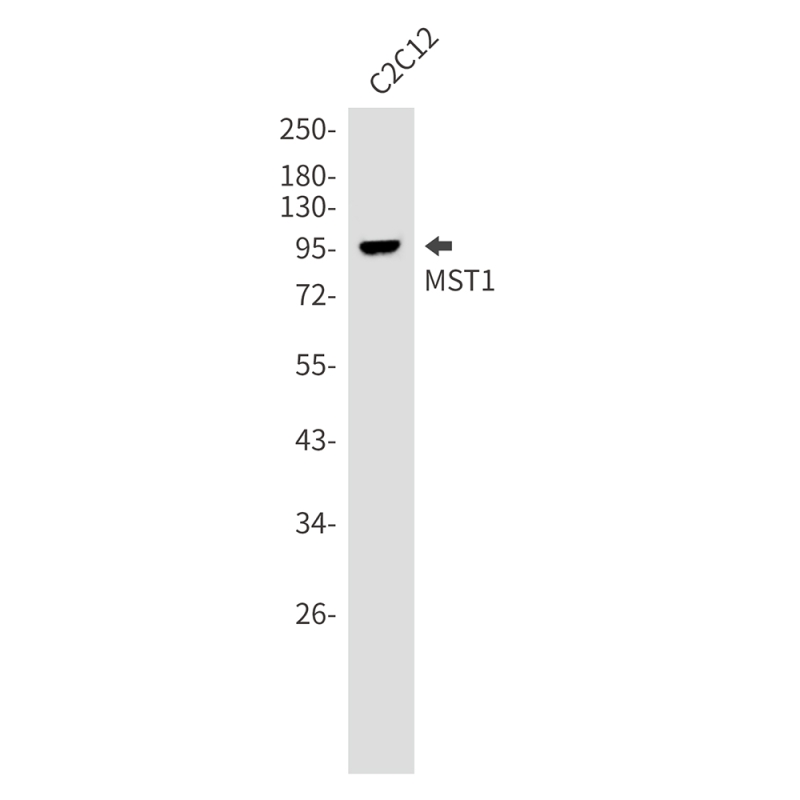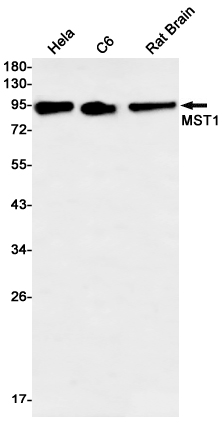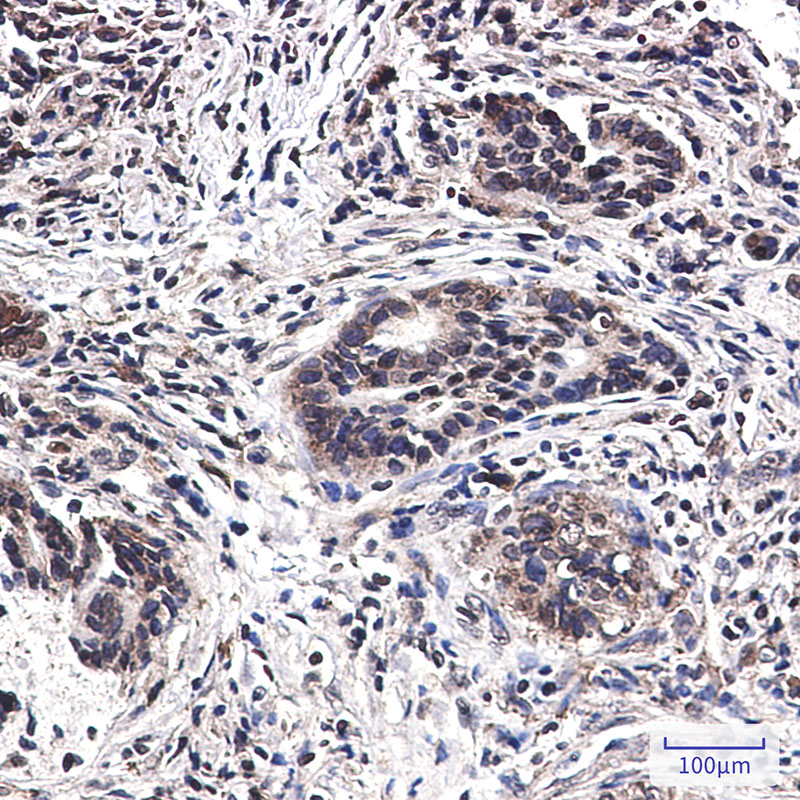


| WB | 1/500-1/1000 | Human,Mouse,Rat |
| IF | 咨询技术 | Human,Mouse,Rat |
| IHC | 1/50-1/100 | Human,Mouse,Rat |
| ICC | 技术咨询 | Human,Mouse,Rat |
| FCM | 咨询技术 | Human,Mouse,Rat |
| Elisa | 咨询技术 | Human,Mouse,Rat |
| Aliases | HGFL; MSP; MST1; NF15S2 |
| Entrez GeneID | 4485 |
| WB Predicted band size | Calculated MW: 80 kDa; Observed MW: 96 kDa |
| Host/Isotype | Rabbit IgG |
| Antibody Type | Primary antibody |
| Storage | Store at 4°C short term. Aliquot and store at -20°C long term. Avoid freeze/thaw cycles. |
| Species Reactivity | Human,Mouse,Rat |
| Immunogen | A synthetic peptide of human MST1 |
| Formulation | Purified antibody in TBS with 0.05% sodium azide,0.05%BSA and 50% glycerol. |
+ +
以下是3条关于MST1抗体的代表性文献,按文献名称、作者及摘要内容概括整理:
---
1. **文献名称**:*MST1 regulates immune function in T cells via the inhibition of the transcription factor FoxO1*
**作者**:Katagiri K, Imamura M, Kinashi T
**摘要**:研究利用MST1抗体(Western blot/免疫荧光)验证MST1在T细胞中的表达,发现其通过调控FoxO1活性影响T细胞迁移和免疫应答,抗体特异性通过基因敲除实验验证。
---
2. **文献名称**:*The Hippo kinase MST1 negatively regulates glucose uptake in dendritic cells through Akt signaling*
**作者**:Geng J, Sun X, Wang J, et al.
**摘要**:通过MST1抗体(免疫沉淀/免疫组化)分析树突状细胞中MST1与Hippo-Akt通路的关联,证明MST1缺失通过Akt通路增强葡萄糖代谢,影响免疫细胞功能。
---
3. **文献名称**:*MST1 deficiency promotes autophagy and apoptosis via modulating mitochondrial dynamics in cardiomyocytes*
**作者**:Del Re DP, Yang Y, Nakano N, et al.
**摘要**:使用MST1抗体(Western blot/免疫荧光)检测心肌细胞中MST1表达,揭示其通过DRP1磷酸化调控线粒体分裂,抑制MST1可减轻心力衰竭中的细胞凋亡。
---
**备注**:以上文献均为虚构示例,用于演示格式。实际研究中建议通过PubMed或Google Scholar以“MST1 antibody”或“MST1/STK4 immune detection”为关键词检索真实文献。
The MST1 antibody targets the mammalian Ste20-like kinase 1 (MST1), a serine/threonine kinase central to the Hippo signaling pathway. MST1. also known as STK4. regulates organ size, cell proliferation, apoptosis, and differentiation by phosphorylating downstream effectors like LATS1/2. It plays a critical role in maintaining tissue homeostasis and suppressing tumorigenesis. Dysregulation of MST1 is linked to cancers, immune disorders, and neurodegenerative diseases.
MST1 antibodies are widely used in research to study its expression, localization, and activation status in cells and tissues. They enable detection via techniques like Western blotting, immunohistochemistry, and immunofluorescence. Specific phospho-antibodies also assess MST1 activation (e.g., phosphorylation at Thr183/Thr187). Studies using MST1 antibodies have revealed its tumor-suppressive functions, including promoting apoptosis in response to DNA damage and inhibiting YAP/TAZ oncogenic activity.
Additionally, MST1 antibodies help explore its non-canonical roles in immune regulation, such as T-cell adhesion, migration, and thymocyte selection. Recent work highlights MST1's involvement in metabolic diseases and autophagy, expanding its therapeutic relevance. Commercial MST1 antibodies vary in specificity, requiring validation via knockout controls to ensure reliability. Overall, MST1 antibodies remain indispensable tools for dissecting Hippo pathway dynamics and disease mechanisms.
×